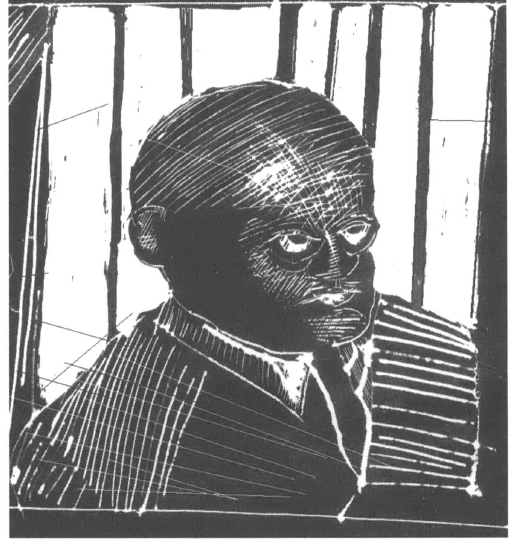
This article originally appeared in Southern Exposure Vol. 22 No. 4, "Drive-Through South." Find more from that issue here.
“The average man would sooner die and go to hell than to spend 10 minutes cutting sugarcane on the prison plantation down in Angola, Louisiana. I’ll tell you what it’s like at Angola State Prison, but I warn you, it’s not a pretty picture. The only place I ever heard of that might be worse is Parchman Prison Farm up in the Mississippi Delta.”
I was talking to this guy I know about prison stories. I believe that anywhere you got people with time on their hands, you are going to find people telling some good stories. Where else you going to find so many people with so much time on their hands? I know there has to be a good bunch of prison stories.
I have had my time in jail, but most the times I had to go to jail it was somebody standing there waiting to bail me out if I wanted to. But I did see enough while I was on the inside to recognize that most of the people in jail have been there before. That ought to tell you something right there. I’ve been trying my best to figure out how people who are supposed to be intelligent figure that putting people in jail is the best way to solve the crime problem. Jail is more like a school for crooks than anything else — and expensive, too. It costs three times more for a person to go to jail than it does to go to one of those fancy colleges. Not only do people who go to jail cost us more money while they’re in jail, they usually cost even more when they get out — partly because of what they learned in jail. People who get educated in regular schools and colleges usually make money for themselves and their communities. “Three strikes and you’re out” sounds like a dumb idea for anybody who really wants to solve the crime problem. I want all the people who believe that such a dim-witted policy will work to send me a check and a sealed bid to the Brooklyn Bridge.
We’ve already got more young black men between the ages of 15 and 30 in jail than we’ve got in college. No wonder our national debt is growing. I guess the fact that they’re building more jails than schools means that they’re planning to use those cells for something.
Matter of fact, during the time when there was so much rioting going on in the cities, most of the schools and public buildings that were built in “high-risk,” “inner-city” — better known as black — neighborhoods were built in such a way that with a chain-link fence and a couple of guards, you could turn them into concentration camps — or what they more politely call detention centers. If you think I’m lying, check it out for yourself. The next time you pass a school, office building, or other public building (especially federal property built since 1965), you’ll see that it could easily be converted into a jail. The windows — if they have any at all — are so skinny that the light has to turn a corner to get in.
But I was going to tell you the story my friend told me that day. I call it “Elmer Fudge’s Fingers” because I had to change the names to protect the innocent. My friend I’ll just call Rudie Toot Toot the Saxophone Man. Rudie Toot Toot is the type of fellow you wouldn’t expect to find in a state prison. “Federal prison . . . maybe, but I have too much class to be stuck in a joint like that,” he told me. When he got busted, he already had a college education, a good job, a good wife, kids, and connections. The way he put it was, “One day I was zigging when I should have been zagging, and it cost me seven good years of my life.
“Due to the fact that I was a pretty good horn player, they put me in the prison band the first week I was there. Which made me look like a big shot to the other prisoners because I went into the joint with the right to go out from time to time. It’s a good thing they gave me that privilege, too, because I don’t know how I would have dealt with those big muscle-building thugs that started smiling and talking about the fresh new meat on the yard as soon as I walked in the gates.
“One of the meanest dudes there was this little chocolate brown, bald-headed, muscle-bound killer that looked like Elmer Fudd. (You remember the little bald-headed dude from the comic strips?) Elmer Fudge was only about five feet five inches tall, but he was built like a Sherman tank. I knew he was a killer before anyone told me because he had cold, unblinking eyes like a fish, a shark, or something like that. He was sitting across from me at dinner soon after I got there. He wouldn’t eat like other people, by chewing his food. No matter what it was — government surplus horse meat or stringy green beans — he’d just suck it down.
“On the day in question he’d already finished his half-cooked rice and watered-down red beans before anyone else had finished complaining about how dry the cornbread was or how much sugar and saltpeter was in the Kool-Aid. He banged his plate on the table, belched, and said, ‘Gimme your beans.’ I looked around to see who he was talking to.
“He belched again and said, ‘Gimme your goddamn beans, bitch.’ Three dudes slid their plates over to the evil little man. I’d have given him mine, too, if I’d thought he wanted it, but he never looked at me. See, it was already out on the prison grapevine that I was in the band. The fact that I had the privilege to go out from time to time made the other inmates think that I had some pull with the warden or something, so they gave me a little room. There’s no way I could have beat him in a fight.
“Most of the fights happened on the way to or from meals. That’s when it was easiest for people to get together and hardest for the guards to stop them. To tell the truth, the guards didn’t give a damn long as the prisoners only beat up on each other.
“Toward the end of my second month at Angola, I was on the way home from dinner and came up on this big fight. It was Elmer Fudge and this guy they called Big Mack. The day before, Elmer had reached to get a piece of pickled pork fat off Big Mack’s plate, and without even looking to see who it was, Big Mack had backhanded Elmer, knocking him across the dining room floor.
“Big Mack was a nice guy. He stood about six foot eight and must have weighed about 350 pounds. For anyone else, it would have been a badge of honor that they survived a lick even from the back of Big Mack’s hand, but for Elmer Fudge, it might as well have been the kiss of death. See, in the joint, a man is no better than his reputation, and Elmer Fudge had the reputation of a killer. If he ever backed down from a backhand slap, even from Big Mack, he was dead meat, so everybody knew Elmer Fudge had no choice.
“Elmer had been laying for Big Mack at the comer where the wooden walk turned to go from the mess hall to the recreation area at the back of the main yard. He had made a knife by filing down a spoon handle and wrapping the end with newspaper and shoelaces. When Elmer Fudge jumped Big Mack, Big Mack blocked him and got a scratch on his left shoulder. It was a lot of blood, but he wasn’t hardly hurt at all. When Big Mack saw Elmer’s knife, he pulled a big cane-cutting knife that looked like a machete. Somehow he’d managed to hide it down his pant leg. Seeing Mack head for him swinging that machete, Elmer pulled a length of two-by-four from the wooden sidewalk to block the blows from that knife.
“By the time I got there, Elmer was getting the best of the fight. He had Big Mack’s back up against the wall. You could see the fear in Big Mack’s eyes. Elmer was moving in for the kill. Big Mack made a mighty swing with his machete. Elmer ducked and moved to block the blow with his two-by-four. I can still hear the soft sound of the machete as it sliced through the flesh and bone of the bottom two fingers of Fudge’s left hand. The blood spurted out as his fingers flopped a bit before they fell off — and Fudge continued to fight. Big Mack’s mouth dropped open. He must have been surprised by the fearsome force that Fudge continued to fight with.
“That little pause was all that Elmer Fudge needed. He was into Big Mack’s midsection with that homemade knife — once, twice. On the third time, the flimsy blade bent. I don’t know if he struck a rib or what. Before Elmer could kill Big Mack, the guards came and broke it up. They got them over to the infirmary, and life went on.
“The next day on the way to lunch, there was another fight at the same spot. The guards broke that up pretty fast. It was two dudes that worked in the kitchen. They were fighting over which one of them would get Elmer Fudge’s fingers. They wanted to use the meat to season their beans that day.”
I was shocked by what Tootie had told me, and the off-the-cuff way he had of telling it. I asked him how he felt about what had happened. “In prison,” he said, “you can’t afford to feel.” He thought about it for another minute, and then added, “It’s not all that different than it is in the world outside. You can’t afford to stop and think about what’s going on, or you won’t be able to make it.” The silence between us was hard to take, but I could think of nothing more to say. After a moment Tootie sort of laughed to himself and said, “That next week, we wrote a real wild jazz tune — it was really out, man, outside the scales, outside the harmonies, outside the rhythm, I mean OUT. You should have heard it. It was wild. We called it ‘Elmer Fudge’s Fingers.’ It wasn’t long after that we were taken to play for a reception at the Governor’s Mansion. We used the tune to close the last set.” Tootie giggled to himself again and said, as if he wasn’t talking to me any more at all. “It was a heavy tune, Junebug. When we got through, half the crowd just sat there until we got done packing up.”
Tags
Junebug Jabbo Jones
Junebug Jabbo Jones sends along stories from his home in New Orleans through his good friend John O’Neal. (1994-1997)
John O'Neal
John O'Neal was a co-founder and director of the Free Southern Theater for almost 20 years. He is currently touring the nation in his one-person play, Don't Start Me Talking Or I'll Tell Everything I Know: Sayings from the Life and Writings of Junebug Jabbo Jones. (1984)
John O ’Neal is co-founder and director of the Free Southern Theater in New Orleans. O’Neal’s one-person play, “Don’t Start Me to Talking Or I’ll Tell Everything I Know, ” is currently touring the country. (1981)

